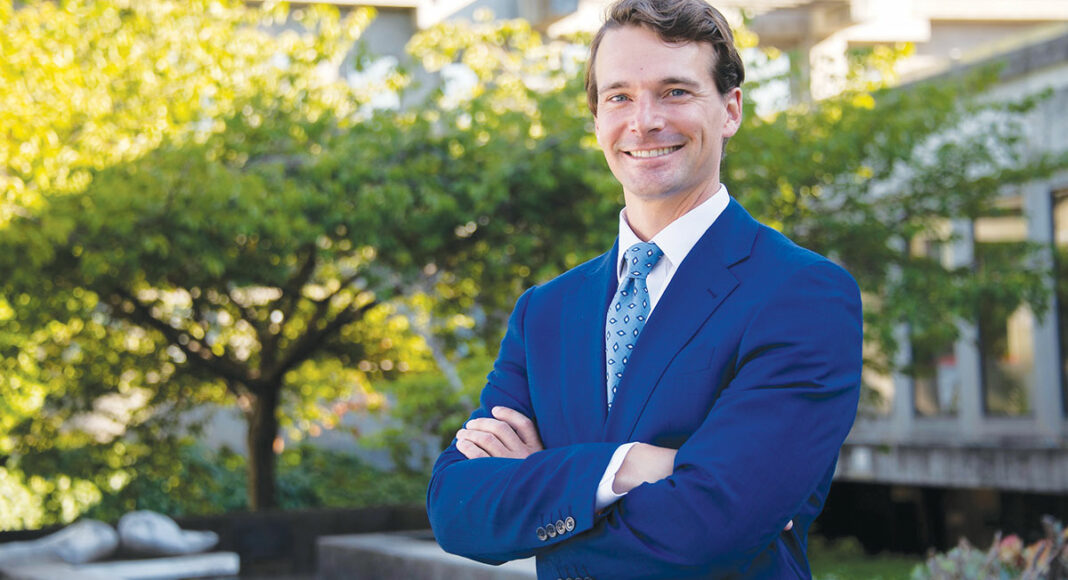Two weeks after an election in which he drubbed the 12-year incumbent county supervisor by 14 percentage points, transportation activist Manu Koenig is getting ready for his new gig, taking interviews for analyst positions, meeting department heads and reviewing a backlog of constituent issues, he says.
Koenig, a 35-year-old political newcomer with no elected experience, will replace District 1 Supervisor John Leopold, the board’s longest tenured member, this January. The headline disagreement between each candidate was on the rail corridor. Koenig advocated a bike-and-pedestrian trail along the corridor, while Leopold has supported a combination of a trail and a new passenger transit line.
But challenges in District 1 are much more complex than a single transportation issue on a narrow stretch of land, says local journalist and historian Geoffrey Dunn, a longtime District 1 resident (Dunn is also a GT senior contributing editor).
“The issues now facing the first district are bigger than just the rail trail,” says Dunn, who endorsed Leopold in the race. “Manu is going to have catching up to do, and there’s incredible diversity in the district, which goes from the Prospect Heights neighborhood all the way to the ocean, up to summit and including all of Live Oak. The issues are complicated, and I look forward to seeing Manu being able to rise to the challenge, I do. He seems young, bright and energetic.”
Leopold, who has been working with Koenig on the transition, says he’s proud of his achievements over the years. He cites a fracking ban, the alcohol usage abatement program, and vacation rental regulations as key policies. He lists new District 1 facilities like the Live Oak Boys and Girls Club, as well as new parks and greenspaces like Chanticleer Park, the Heart of Soquel Park and improvements to East Cliff. “I’m proud of the accomplishments I’ve had in so many different areas,” he says.
Over the past 12 years, Leopold developed a reputation as someone unafraid to take a strong stance on sometimes controversial topics.
Cannabis attorney Ben Rice says Santa Cruz County had a longstanding reputation for being open to cannabis, but he believes Santa Cruz County has grown unnecessarily stringent on the legalized industry. Leopold, Rice says, pushed to bring more small-time growers into the county’s permitting system. He adds that, although Leopold didn’t win every fight, more growers would have been squeezed out without him.
“Unfortunately, a lot of times he’s been a voice in the wilderness, because for the last 10 years, the county has been really slow to embrace the possibilities,” Rice says.
Koenig, for his part, says he has similar values on cannabis. He hopes to support cannabis entrepreneurs, he says, ensuring that they have a legal pathway to being regulated businesses. Many such entrepreneurs, he says, are throwing up their hands and moving to Monterey County. His vision, however, will not mean putting in new dispensaries on every corner, he adds.
Harm reduction activist Denise Elerick remembers Leopold’s unflinching dedication to community causes he found important, even when they didn’t present a clear political wn.
Elerick recounts holding a 2018 event about the opioid crisis. Most of the politicians she wrote did not respond to her invitation, and Leopold was the only county supervisor who showed up.
UCSC professor Craig Reinarman recalls when Leopold first led the charge to create a new Smart on Crime group that started discussions around public safety and criminal justice reform. Reinarman, who joined the group, says Leopold then led the way when it came to implementing changes to the local jail mandated by California voters.
Leopold, for what it’s worth, bristles at questions about such high-profile policies, saying they weren’t central concerns of constituents in his district. He prefers to be remembered for his efforts to expand health care and educational programs in District 1.
Koenig says Leopold worked extraordinarily hard in his post as the District 1 supervisor, and he plans to continue that tradition of work ethic. Going forward, Koenig says he wants to put people first and thinks some of the county’s outreach is in need of systemic change.
He says he’ll implement the same approach and the same tools he used in his campaign.“Focus on the issues,” he tells GT via email, “leverage technology, and recruit people who are smarter than me.”












having both won and lost at election time, I can say that it is better to win. my opponent this year offered NO cogent or valid rationale why he should be reelected. He acted surprised at losing by a wide margin.
i would say to Manu, if you don’t have valid goals at the outset, you will not be successful.
I do, and the people responded. i defeated an eight year Republican incumbent in district 7 for the Cabrillo college district board of trustees. this is my second term to serve in public office. I served as a member of the Santa Cruz city school district board of trustees from 2010 to 2014.
I established valid goals then as well. and yes, I have an agenda. and I am proud of it. this is NOT a duplicate comment.